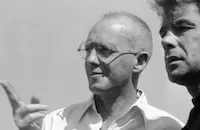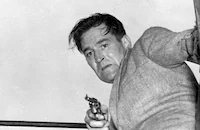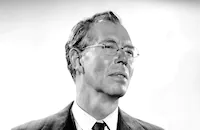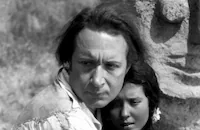Ride, Vaquero!

Brief Synopsis
Cast & Crew
John Farrow
Robert Taylor
Ava Gardner
Howard Keel
Anthony Quinn
Kurt Kasznar
Film Details
Technical Specs

Synopsis
Following the end of the Civil War, rough-hewn Mexican bandit leader Jose Esqueda warns the people in his South Texas village that they are in danger of losing their land to the homesteading "Americanos," who are descending upon the Brownsville area. While the villagers cheer Esqueda when he vows to burn down the settlers' homes, Rio, an American who was reared by Esqueda's mother and regards him as a brother, shows little support for the plan. The first hacienda the bandits set on fire is the new home built by rancher King Cameron for his wife Cordelia. Risking his life to do what he believes is right, Cameron organizes a meeting at the local church to put a stop to Esqueda's raids. Esqueda and Rio are among those attending the meeting, and when Cameron calls Esqueda a "murderer, a thief and a coward," the bandit laughs openly at his accusations. The meeting ends abruptly after Cameron vows to fight Esqueda. No sooner does Cameron rebuild his house, than Esqueda sends Rio and his men to burn it down again. Father Antonio, the respected village priest, warns Cameron that Esqueda is planning an attack on his property and, while praying for the couple's safety, helps them ward off the gang. The gun battle is cut short with the arrival of the rangers, and Rio is captured by Cameron. Instead of turning Rio over to the soldiers, Cameron offers him a partnership, and insists that the bandit help him bring over some horses from Mexico. Though Cordelia disapproves of the plan, believing that Rio should not be trusted, the two men quickly depart for Mexico. Along the way, Rio proves his trustworthiness when he saves Cameron from drowning in a river. Soon after Cameron and Rio return from Mexico, Esqueda discovers their partnership, but forgives his foster brother's apparent desertion as he believes that Rio joined Cameron because he is in love with Cordelia. Cordelia eventually comes to trust Rio, and one day, when Cameron is away, she asks him to take her to Esqueda. Angered by Esqueda's rude dismissal of her request that he end his raids, Cordelia grabs his gun and threatens to kill him. She decides not to shoot, however, when Esqueda tells her that Rio would be killed by his gang as a consequence of her action. Later, Cordelia, now in love with Rio, steals a kiss from him, but he strikes her for the impropriety. When Esqueda learns that Rio has been spurned by Cordelia, he believes that Rio will now remain loyal to him and will not interfere with a raid on the "gringo" town of Brownsville. Esqueda and his gang then shoot their way into Brownsville, kill the sheriff and rob the bank. In a drunken rage, Esqueda decides to kill Rio, Cordelia and Cameron, and sends one of his men to find them. Meanwhile, word of the siege of Brownsville reaches the Cavalry commander, who immediately sets out to regain control of the town. Esqueda's men flee when they see the approaching Cavalry, but the bandit leader stays behind to kill Cameron. After wounding Cameron with four gunshots, Esqueda is about to kill him, when Rio arrives and points his gun at him. The two face off in a gun draw and are killed simultaneously. As Father Antonio prays over the dead men, Cameron returns to the arms of Cordelia, whom he forgives for her feelings for Rio.

Director

John Farrow
Cast

Robert Taylor

Ava Gardner

Howard Keel

Anthony Quinn

Kurt Kasznar

Ted De Corsia
Charlita
Jack Elam

Walter Baldwin
Joe Dominguez
Frank Mcgrath
Charles Stevens
Rex Lease
Tom Greenway
Paul Fierro
Percy Helton
Jimmie Fox
Norman Leavitt
Movita Castañeda
Robert L. Diamond
John Call
Jim Hayward

Monte Blue
Frank Hagney
Philip Van Zandt
Stanley Andrews
Pedro Regas
Terry Wilson
Henry Wills
Archie Butler
Capt. George Watkins
Harry Brown
Joey Ray
Italia De Nubila
Wilson Wood
Manuel Alda

Kay English
James H. Harrison
Robert Stephenson

Emmet Vogan
Stuart Holmes
Almira Sessions
Crew
Stephen Ames
Alvord Eiseman
Frank Fenton
Cedric Gibbons
A. Arnold Gillespie
Sydney Guilaroff
Bronislau Kaper
Harold F. Kress
Stan Lambert
Arthur Lonergan
Fred Maclean
Jay Marchant
Fr. John Pick
Walter Plunkett
Douglas Shearer
Robert Surtees
Jerry Thorpe
William Tuttle
Edwin B. Willis

Videos
Movie Clip


Trailer
Film Details
Technical Specs

Articles
Ride, Vaquero!
In her autobiography, Ava Gardner, Taylor's co-star in three movies, including this one, said, "Bob couldn't stand those parts. He wanted parts that mirrored his real life. He wanted to be out there fighting against the toughies and shooting the baddies."
By the early 1950s, however, Taylor's matinee-idol looks were starting to show signs of wear, and although he was still considered appealing enough to be cast as Sir Lancelot (opposite Gardner again) in Knights of the Round Table (1953), he was also able to open his range to include this Western (whose title can be roughly translated as "Ride 'Em, Cowboy!"). In Ride, Vaquero! (1953), he plays Rio, adoptive brother of vicious outlaw Esqueda (Anthony Quinn in a performance that earned the film its top critical raves). Esqueda has developed a strong hatred for rancher King Cameron (Howard Keel) and his bride Cordelia (Ava Gardner) and fires up a bloody campaign to rid his territory of the couple. Fearing an all-out attack, the Camerons turn their property into a fortress, managing not only to beat back their enemy's assault but also to capture Rio in the process. Cameron persuades the outlaw lieutenant to stay on as a ranch hand, and an attraction soon develops between Rio and Cordelia that will shift Rio's loyalties and bring him into direct, violent confrontation with his adoptive brother.
Despite dissatisfaction with many of the roles he was offered, Taylor's loyalty to Metro was lasting. He remained under contract about 30 years, long after the studio system had collapsed and far longer than his contemporaries would hang on.
Ride, Vaquero! was one of MGM's first big-scale wide-screen Westerns. It was directed by John Farrow, husband of actress Maureen O'Sullivan (Jane to Johhny Weismuller's Tarzan) and father of Mia Farrow. It also boasts the talents of Frank Fenton, who maintained successful dual careers as both actor and screenwriter, and cinematographer Robert Surtees, whose long career included Thirty Seconds Over Tokyo (1944), The Bad and the Beautiful (1952), The Graduate (1967), and The Sting (1973).
Director: John Farrow
Producer: Stephen Ames
Screenplay: John Farrow, Frank Fenton
Cinematography: Robert Surtees
Editing: Harold F. Kress
Art Direction: Cedric Gibbons, Arthur Lonergan
Cast: Robert Taylor (Rio), Ava Gardner (Cordelia Cameron), Howard Keel (King Cameron), Anthony Quinn (Esqueda), Kurt Kasznar (Father Antonio), Ted de Corsia (Sheriff Parker).
C-91m.
by Rob Nixon

Ride, Vaquero!
TCM Remembers Howard Keel this Monday, Nov. 15th
PLEASE NOTE SCHEDULE CHANGE
6:00 AM
Callaway Went Thataway (1951)
7:30 AM
Ride, Vaquero! (1953)
9:30 AM
War Wagon (1967)
11:30 AM
"MGM Parade Show #14"
(Keel talks with George Murphy about his latest MGM picture "Kismet")(1955)
12:00 PM
Showboat (1951)
2:00 PM
Kiss Me Kate (1953)
4:00 PM
Seven Brides for Seven Brothers (1954)
6:00 PM
Kismet (1955)
HOWARD KEEL (1919-2004):
Howard Keel, the strapping singer and actor whose glorious baritone took him to stardom in the early '50s in some of MGM's best musicals, including Showboat, Kiss Me Kate and Seven Brides for Seven Brothers, died on November 7 of colon cancer at his home in Palm Desert, California. He was 85.
He was born Harry Clifford Leek on April 13, 1919, in Gillespie, Illinois. His father, was a coal miner and his mother, a strict Methodist, forbid the children from enjoying popular entertainments. When his dad died, his mother relocated the family to California when Harry was still a young teenager.
After he graduated high school, Keel had a brief stint as a singing busboy, but had not considered a professional career as a vocalist....until one fateful evening in 1939. It was at this time he saw celebrated opera singer, Lawrence Tibbett, at the Hollywood Bowl. Keel was inspired, and he soon began taking voice lessons. Over the next several years, he carefully trained his voice while entering any singing contest he could find. It wasn't long before his talents caught the attention of Rodgers & Hammerstein.
In 1946, they signed him to replace John Raitt in the Broadway production of Carousel, changed his name to Howard Keel (His proper surname Leek spelled backwards), and Keel was on his way to international stardom.
After his run in Carousel ended, he sailed to London the following year to play the role of Curley in Rodgers & Hammerstein's Oklahoma. He received rave reviews from the London press, and by the time he returned to the United States in 1948, he was ready to make his move into films.
Keel made his movie debut in the British thriller, The Small Voice (1948), but it would be his second film, and first for MGM, portraying Frank Butler, Betty Hutton's leading man in Annie Get Your Gun (1950), that sealed his success. Keel's several strengths as a performer: his supple, commanding singing voice; his athletic, 6'4" frame; striking, "matinee-idol" good looks; and his good humored personality made him one of the studios' top leading men over the next few years. Indeed, between 1951-55, Keel could do not wrong with the material he was given: Show Boat (1951), Lovely to Look at (1952), Kiss Me Kate (1953), Seven Brides for Seven Brothers (1954), and Kismet (1955). Clearly, he was a shining star in this golden era of the MGM musical.
By the late '50s, movie musicals began to fade out of fashion, but Keel returned to the stage and had success performing with several touring companies. He made a brief return to films when he was cast as a seaman battling carnivorous plants from outer space in the popular British sci-fi hit, The Day of the Triffids (1962). Television also provided some work, where he guest starred in some of the more popular shows in the late '60s including Run For Your Life, and The Lucy Show.
Keel would keep a low profile over the next decade, but he made an amazing comeback in 1981, when he was cast as Clayton Farlow, Ellie Ewing's (Barbara Bel Geddes) second husband in the wildly successful prime time soap, Dallas. Not only did he play the role for ten seasons, but Keel would also be in demand for many other shows throughout the '80s and '90s: The Love Boat, Fantasy Island, Murder, She Wrote, Hart to Hart, and Walker, Texas Ranger, to name a but a few. By the late-'90s, Keel retired to his home in Palm Desert, California, where still made public appearances now and again for a tribute or benefit. He is survived by his wife of 34 years, Judy; a son, Gunnar; daughters, Kaija, Kristina and Leslie; 10 grandchildren, and one great-granddaughter.
by Michael T. Toole
Important Milestones on Howard Keel:
1933:
Moved to Southern California at age 16 (date approximate)
Worked as a singing busboy in a Los Angeles cafe
Worked for Douglas Aircraft as a manufacturing representative travelling among various company plants; work included singing; won a first prize award at the Mississippi Valley while on the road; also won an award at the Chicago Music Festival
Began singing career with the American Music Theatre in Pasadena, California
Chosen by Oscar Hammerstein II to perform on Broadway in "Carousel"; succeeded John Raitt in the leading role of Billy Bigelow; also took over the leading role of Curly in "Oklahoma"
1947:
Recreated the role of Curly when he opened the London stage production of "Oklahoma"
1948:
Made feature film debut in a non-singing supporting role in the British crime drama, "The Small Voice"
1950:
Signed by MGM; became instant star as the male lead of "Annie Get Your Gun"
1951:
Provided the offscreen narration for the Western saga, "Across the Wide Missouri", starring Clark Gable
1951:
First film opposite Kathryn Grayson, "Show Boat"
1952:
First leading role in a non-musical, "Desperate Search"
1954:
Made best-remembered film, "Seven Brides for Seven Brothers"
1955:
Last musical starring roles, and last musicals for MGM, "Jupiter's Darling" and "Kismet"
1958:
Went to Britain to play the leading role in the action drama, "Floods of Fear"
1967:
Last leading role, "Red Tomahawk"
1968:
Last feature film appearance for over 20 years, "Arizona Bushwhackers"
Starred on the London stage in the musical "Ambassador"; later brought the role to Broadway (date approximate)
Toured the nightclub circuit, sometimes teaming up with his co-star from three MGM musicals of the 1950s, Kathryn Grayson
Toured in stage productions of musicals and comedies including "Camelot", "Man of La Mancha", "Paint Your Wagon", "I Do! I Do!", "Plaza Suite", "Gigi", "Show Boat", "Kismet", "The Most Happy Fella" and "The Fantasticks"
1977:
Teamed with Jane Powell on record-breaking national theater tour of "South Pacific"
1978:
Reprised screen role of eldest brother Adam in a touring stage version of "Seven Brides for Seven Brothers", opposite original screen co-star Jane Powell
Joined the cast of the CBS primetime serial drama, "Dallas", which had premiered in 1978; played Clayton Farlow
1983:
Recorded first solo album, "And I Love You So"
1994:
Was one of the hosts of the feature compilation documentary, "That's Entertainment III", revisiting the MGM musical from the coming of sound through the late 1950s
Keel was President of the Screen Actors Guild from 1958-1959.
TCM Remembers Howard Keel this Monday, Nov. 15th PLEASE NOTE SCHEDULE CHANGE
Quotes
Can you imagine a smile on Barton's face?- Jose Esqueda
It's the only place where a smile could be ugly.- Rio
Trivia
Notes
The working title for this film was Vaquero. A July 2, 1952 Hollywood Reporter news item reported that television actress Rita Gam had tested for the leading role. According to a July 29, 1952 news item in Hollywood Reporter, Jay C. Flippen was cast, but he was not in the film. Hollywood Reporter news items add Dave Cashner and Cal Perry to the cast, but their appearance in the final film has not been confirmed. Portions of the film were shot on location in Kanab and Sky Valley, UT. The picture marked John Farrow's first credited film for M-G-M, although he had done some work on the 1936 film Tarzan Escapes (see AFI Catalog of Feature Films, 1931-40). Ride, Vaquero! was also the last film of producer Stephen Ames, who died on April 22, 1954.

Miscellaneous Notes
Released in United States Summer June 7, 1953
Released in United States Summer June 7, 1953














